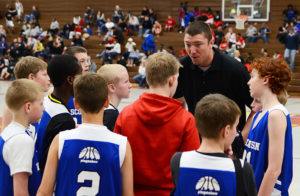How varsity coaches can help their junior high counterparts
 Great Expectations is a novel written by Charles Dickens. Expectations — great or otherwise — are what every high school varsity basketball coach should have for the middle school coaches in their program.
Great Expectations is a novel written by Charles Dickens. Expectations — great or otherwise — are what every high school varsity basketball coach should have for the middle school coaches in their program.
These should be clearly spelled out, be based on the head coach’s philosophy and school policies, and be tempered with an understanding of coaching boys or girls in that age group. But the gate should swing both ways, and it can be a frustrating season for a middle school coach if his or her expectations of the varsity head coach aren’t met.
Think about it. Most workplaces list some kind of expectations for their employees, but the employees often are given no insight and have no input on what they expect from their bosses to help them do their jobs.Experience may show that these concerns should be raised during the interview process when one is seeking a position as a middle school coach, and that if the answers aren’t to the candidate’s liking, he or she may be better off passing on the opportunity.
So what are reasonable — no, let’s make them great — expectations that a middle school coach should have for the varsity coach? Many can be listed, and here are a few.
1. Don’t micromanage the middle school coach’s team.
It will vary from head coach to head coach how much of their influence they want on the middle school playbook, but it’s an overbearing head coach who doesn’t allow the middle school coach to use some of his or her own ideas and set their own teaching plans for practices.
For one, the middle school coach knows their team and its strengths and weaknesses better than the varsity head coach. Also, most people who get into coaching, even at the middle school level, would like to have some part of the process be part of their own thoughts and ideas. Few want to be robots for the varsity coach.
2. Treat the middle school coach like a colleague, not an underling.
Even if the head coach has no interest in receiving input from their middle school coaches, they should at least give some indication that they respect their opinions and are willing to listen to them.
Middle school coaches often seek advice from the varsity coach, and when they do, the tone of a conversation and not of a lecture is usually appreciated. No one likes being “talked at” instead of being “talked to.”
A middle school coach feels like they are part of the program when the varsity coach seeks their opinion on various things, including how the varsity team looks. Most good varsity coaches realize they can often benefit by receiving input from everyone on their staff. The best coaches at all levels will tell you they always look to learn from other coaches.
3. Don’t saddle the middle school coach with volunteers they don’t want.
Many volunteers in middle school/high school sports programs come in with the best of intentions and are valuable members of the staff, but not all of them.
Some of these volunteers are parents. This isn’t to indict every father who volunteers, but the truth is there are some of them who, after coaching their sons or daughters in various little league sports, still clamor for the control they lost when their child moved into a school system’s program with paid coaches hired by the school board.

These volunteers can bring their own agendas, which have no place in the team setting. No middle school coach should be told without discussion that so-and-so’s father is now their assistant. The middle school coach is the person who will work with the team every day. They should not be stuck in the gym or on the bench with a volunteer they don’t want or can’t work with.
4. Always have the middle school coach’s back.
It’s a sinking feeling when a middle school coach realizes they can’t trust the varsity head coach to support them to parents, players and the administration. It’s as good as any reason to get out of that particular program.
This doesn’t mean inappropriate behavior shouldn’t be addressed, but many of the complaints about a middle school coach that come to the varsity coach’s attention are unfounded or based on the opinion of parents. They should be treated as such. No parent of a middle school player should ever think he or she can get what they want by simply complaining to the varsity coach. That’s about as foolproof a recipe for a disaster as you can get.
5. Let the players know you stand behind the middle school coach.
It’s good practice for a high school coach to talk to the middle school teams a few times each year. The good ones use these opportunities to try to explain that what they’re going through fits in the big picture of the basketball program and their own careers. The egotistical or insecure ones see it simply as a chance for the younger players to hear them speak and to make themselves look good.
Good middle school coaches often “take a bullet” for the head coach. They are laying the groundwork in terms of discipline, work ethic and player expectations that will benefit the varsity coach down the road. This doesn’t necessarily make them popular with their players.
If the younger players don’t understand that “this is the way we do things in our program,” then they see no reason to follow the structure laid out by the middle school coach. They expect to eventually get their way with a “nicer” coach they like better. This is part of the blueprint for a bad basketball program.
It also wouldn’t hurt for the varsity coach — without laying it on too thick — to let the middle school players know he or she thinks highly of the middle school coach and that they are someone they should listen to and respect.
Like parents who think complaining to the varsity coach will get them what they want, players who feel they can just bide their time before they get what they want are program killers. Their reward will be losing seasons down the road, and that’s one expectation no varsity coach wants to endure.









